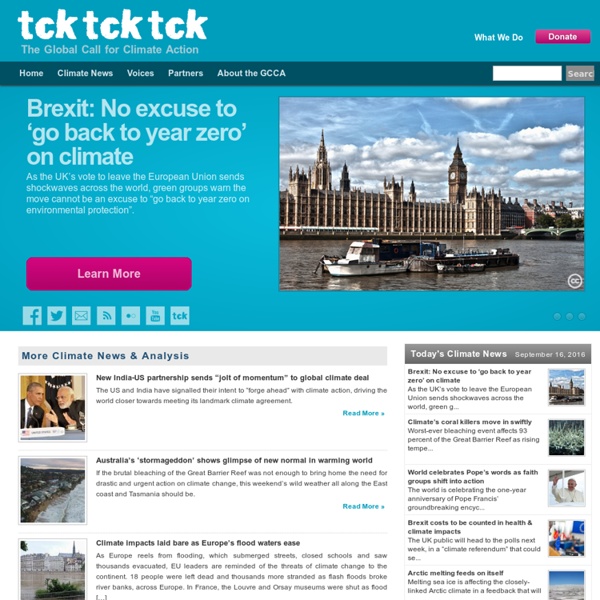



A History of Climate Science Skeptical Science takes a different approach to Naomi Oreskes' Science paper who sorted her papers into "explicit endorsement of the consensus position", "rejection of the consensus position" and everything else (neutral). In this case, the backbone of our site is our list of climate myths. Whenever a climate link is added to our database, it is matched to any relevant climate myths. Therefore, each link is assigned "skeptic", "neutral" or "proAGW" whether it confirms or refutes the climate myth. This means a skeptic paper doesn't necessarily "reject the consensus position" that humans are causing global warming.
WWF What is climate change? Global warming – doesn’t mean we’ll all just have warmer weather in future. As the planet heats, climate patterns change. It’ll mean more extreme and unpredictable weather across the world – many places will be hotter, some wetter, others drier. We know the planet has warmed by an average of nearly 1°C in the past century. That might not sound much, but on a global scale it’s a huge increase and it’s creating big problems for people and wildlife.
Earth Exploration Toolbook Awarded Science Magazine's Science Prize for Online Resources in Education (SPORE), September 30, 2011 AAAS Press Release What is the Earth Exploration Toolbook? Developed by teams of scientists and educators, the Earth Exploration Toolbook (EET) is a collection of online Earth system science activities. Watch 62 Years of Global Warming in 13 Seconds Don't Have Flash? Watch this video on your iPad or iPhone here From our friends at NASA comes this amazing 13-second animation that depicts how temperatures around the globe have warmed since 1950. You’ll note an acceleration of the temperature trend in the late 1970s as greenhouse gas emissions from energy production increased worldwide and clean air laws reduced emissions of pollutants that had a cooling effect on the climate, and thus were masking some of the global warming signal. The data come from NASA's Goddard Institute for Space Studies in New York (GISS), which monitors global surface temperatures.
Climate Science Info Zone - There are many institutions and organisations around the world researching climate science, how our climate is changing, and ways of responding. Here are just a few… British Antarctic Survey (BAS) Department for the Environment, Food and Rural Affairs (Defra) Department of Energy and Climate Change (DECC) Energy Saving Trust (EST) Environmental Change Institute (ECI) European Space Agency (ESA) The Geological Society (GS) Grantham Institute for Climate Change (GICC) Intergovernmental Panel on Climate Change (IPCC) Met Office (MO) National Academy of Sciences (NAS) National Aeronautics and Space Administration (NASA) National Oceanic and Atmospheric Administration (NOAA) National Oceanography Centre (NOC) The Royal Society (RS) Tyndall Centre for Climate Change Research (TCCCR) UK Climate Impacts Programme (UKCIP) United Nations Framework Convention on Climate Change (UNFCCC) World Climate Research Programme (WCRP) World Meteorological Organization (WMO)
Impacts of global warming - WWF-Australia Our climate is determined by patterns of temperature, wind, atmospheric pressure, humidity and rain over a long period of time. There are different climates around the world, such as tropical, dry and moderate. As a large country, Australia has a variety of climates. The climate of an area determines its seasons and when they come and go. One Ocean: The Nature of Things with David Suzuki: CBC-TV One Ocean Download Unity Web Player Get Unity 3D to Play Climate Change Climate change is a change in worldwide climate patterns, like the weather. It is a very important topic in current events because the world is seeing a very large change in climate due to global warming. Useful words and phrases Here are some words and phrases you might come across when researching this topic. Climate: Climate refers to the normal weather patterns of a place, such as average temperature, rainfall, wind etc.
Free Lesson Plans For The Environment The environment is a hot topic – in the news, in politics, and in schools, especially in STEM . Since many aspects of environmental issues are practical, everyday things that even younger students can see, the topic lends itself well to a variety of teaching methods like Project Based Learning and Challenge Based Learning . We recently stumbled upon a great resource that will give you some great ideas and lesson plans relating to the environment that can work regardless of how you’re planning on integrating the information into the curriculum.
Climate Change - United Nations Sustainable Development Climate change is now affecting every country on every continent. It is disrupting national economies and affecting lives, costing people, communities and countries dearly today and even more tomorrow. People are experiencing the significant impacts of climate change, which include changing weather patterns, rising sea level, and more extreme weather events. The greenhouse gas emissions from human activities are driving climate change and continue to rise. They are now at their highest levels in history. The Learning Zone: Rock Cycle Games Skip to content Home Animals Fossils Insects Minerals Rocks Funstuff Have another go Move on to the next levelHaving trouble? Take a closer look at the rock cycle. Site search Site map Accessibility Help Contact us
Bushfire Recovery: 09/02/2016, Behind the News Over the summer holidays, bushfires struck many communities around Australia. For the kids that live in those areas, recovering has been a long process. So we asked some of them to let us know how they were going in the lead-up to school going back. Rookie Reporter Kane has more. Hi, my name's Kane and this is a pretty exciting day for my family. We're getting these cool packs, and so are hundreds of other kids around here.